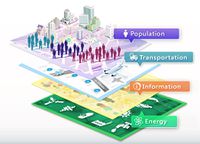Difference between revisions of "Lesson 6"
Jump to navigation
Jump to search
| Line 63: | Line 63: | ||
| − | ==GIS-based | + | ==GIS-based Urban Analysis== |
* [https://link-springer-com.libproxy.smu.edu.sg/content/pdf/10.1007%2Fs11769-002-0039-3.pdf GIS-based analysis of urban land-use changes] | * [https://link-springer-com.libproxy.smu.edu.sg/content/pdf/10.1007%2Fs11769-002-0039-3.pdf GIS-based analysis of urban land-use changes] | ||
| Line 72: | Line 72: | ||
* [https://link-springer-com.libproxy.smu.edu.sg/article/10.1023/A%3A1008045419517 Floodplain Management in Urban Developing Areas. Part II. GIS-Based Flood Analysis and Urban Growth Modelling] | * [https://link-springer-com.libproxy.smu.edu.sg/article/10.1023/A%3A1008045419517 Floodplain Management in Urban Developing Areas. Part II. GIS-Based Flood Analysis and Urban Growth Modelling] | ||
| + | |||
| + | * [https://link-springer-com.libproxy.smu.edu.sg/content/pdf/10.1023%2FA%3A1014262530372.pdf Urban analysis with GIS] | ||
Revision as of 15:33, 22 September 2019
|
|
|
|
|
|
Urban Application of Vector-based GIS Analysis
Contents
Content
Trade Area Analysis
- Defining trade areas
- Examples of trade areas
- Factors that influence trade area
- GIS-based trade area analysis process
- GIS-based trade area delineation techniques
Change Detection
References
Trade Area Analysis
